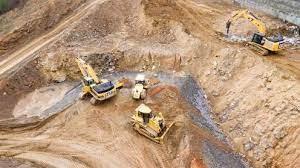The mining industry has a crucial role to play in supplying the minerals and metals that are essential for the ongoing global clean energy transition. According to the International Energy Agency (IEA), a concerted effort to achieve the goals of the Paris Agreement on climate change would require a quadrupling of critical mineral requirements for clean energy technologies by 2040. An even faster transition, to hit net-zero globally by 2050, would require six times more mineral inputs in 2040 than today.
The expected expansion of the mining sector could bring adverse environmental impacts, including deforestation, pollution, and damage to and loss of biodiversity. With this in mind, the fifth meeting of the United Nations Environment Assembly (UNEA5) in March 2022 adopted resolution 5/12 requesting the UN Environment Programme (UNEP) to convene intergovernmental regional consultations, intended to feed into the Global Intergovernmental Meeting, to develop non-prescriptive proposals (NPPs) to enhance the environmental sustainability of minerals and metals along their full life cycle, in line with the 2030 Agenda for Sustainable Development and its Sustainable Development Goals.
The regional consultations were mandated to:
- take stock of existing activities and actions to enhance the environmental sustainability of minerals and metals, and identify best practices, responsible business practices, standards, guidelines, technical tools, environmentally sustainable technologies, and renewable energy uses in mining;
- identify opportunities for enhanced international cooperation; and
- identify possible ways forward for consideration by UNEA6.
In addition to the tasks mandated above, the consultations also discussed two other mining topics which the resolution mandates the UNEP Executive Director to report on at UNEA6, namely: the environmentally sound extraction and use of sand; and environmental aspects of tailings management.
The regional consultations were held in the five UNEP regions from April to July 2023. These developed 24 non-prescriptive proposals (NPPs), which UNEP has grouped into three thematic groups: policies and tools; minerals and metals along the entire life cycle; and platforms for international cooperation. These vary from having UNEP do a global assessment of existing instruments and standards, to creating international metal certification schemes, to promoting circular economy and extended producer responsibility, to developing technical guidelines and standards for tailings management, to guidelines for mine closure, to creating a new intergovernmental working group to follow up on any proposals made by the Global Intergovernmental Meeting, or even exploring the idea of an international agreement on environmental aspects of mining.
The Global Intergovernmental Meeting is expected to discuss the 24 NPPs and through informal breakout sessions to crystallize, refine, and where possible prioritize, the proposals for the report to be considered at UNEA6.
The Global Intergovernmental Meeting will be held 7-8 September 2023 in in Geneva, Switzerland. The Earth Negotiations Bulletin (ENB) will provide daily updates on the proceedings, as well as a comprehensive summary report following the conclusion of the meeting.
The ENB writers for this meeting are Keith Ripley; Daniela Morich; and Wangu Mwangi. The Digital Editor is Anastasia Rodopoulou. The Editor is Leila Mead.










